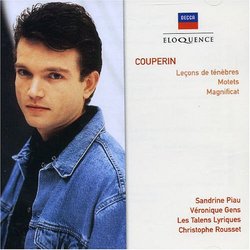Dang! Them Gals Shur Kin Sing!
Giordano Bruno | Wherever I am, I am. | 04/03/2009
(5 out of 5 stars)
"There's nothing like a superb soprano to make a humble instrumentalist feel like a complete musical yokel, and on this recording of 'petits motets' by François Couperin (1668-1733) there are two of the most superb sopranos of our times, Sandrine Piau and Véronique Gens. Sandrine sings the first set of 'lessons for twilight' on Wednesday of Holy Week; Véronique sings the second set, and then, wonder of wonders, they sing the third set together, as composer Couperin enriches his affective fervor with polyphonic profundity. Such "Leçons de Ténèbres" were always composed on texts from the Lamentations of Jeremiah; by the end of the 17th C they had evolved a quasi-liturgical formality while still permitting a vast expressive musical latitude. Some of the greatest sacred vocal music of the baroque era was written for the solemn 'Tenebrae' services on the Wednesday, Thurday, and Friday evenings of Holy Week. Apparently Couperin wrote music for all three services, but only the Wednesday lessons have survived. To my ears, these ecstatic laments are Couperin's finest masterworks.
All three sets of "leçons" are accompanied only by organ, played on this CD by Cristophe Rousset. Though Couperin held the position of organist at the Parisian Church of St. Gervais, as well as being one of four royal organists at Versailles, these pieces were most likely composed for the nuns of the Abbey of Longchamps, outside Paris. How capable the nuns were as singers has never been established, but they were at least good enough to attract a paying audience of outsiders to their convent church for Tenebrae. They sang from behind a screen, of course, but there are accounts of them drawing back the curtain and smiling at members of the audience.
The three motets, also for two voices and organ continuo supported by bass viol, were probably composed for "Low Mass" in Louis XIV's chapel at Versailles. High Mass would have featured the more ample forces of the Grands Motets, of which Couperin is not known to have composed any.
The organ played by Christophe Rousset dates from 1748, but it was restored and retuned in 1992, to its original pitch of A415 with 1/5-comma mean-tone temperament. It's a trade secret that most singers naturally 'gravitate' toward mean-tone tuning and need to be strenuously 'disciplined' to match the equal temperament of the modern piano. However, it's no secret at all that nearly every top-rank Baroque ensemble of today performs exclusively at A415. What you'll hear, and hopefully recognize, in this performance is the exceptionally sweet and 'consonant' tuning of the two sopranos to each other and to their organ continuo.
I'm completely unable to declare a preference for one of these angelic singers over the other. Piau has a slight edge in purity and agility, while Gens has an edge in dramatic affect. Together they make me want to be a mouse in their convent. Why Decca has chosen to picture young Monsieur Rousset on the cover of this CD remains a mystery. I mean, he's cute in his denim suit, but...."


 Track Listings (6) - Disc #1
Track Listings (6) - Disc #1